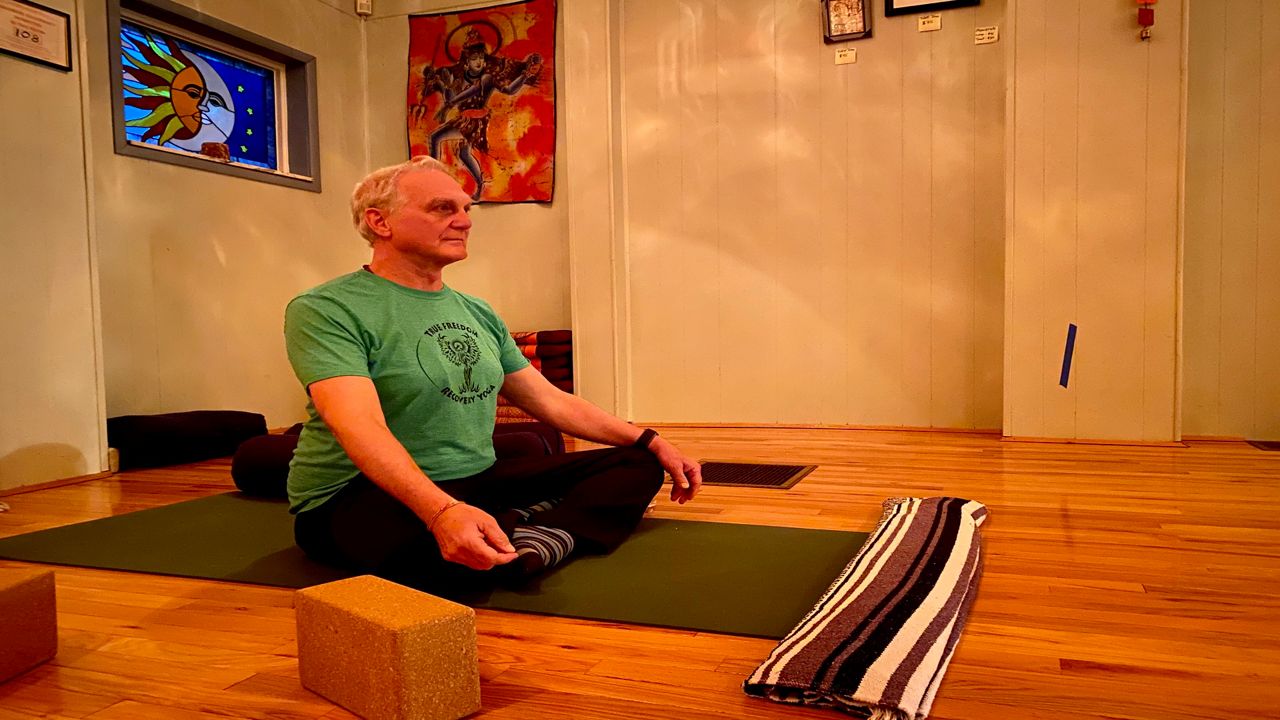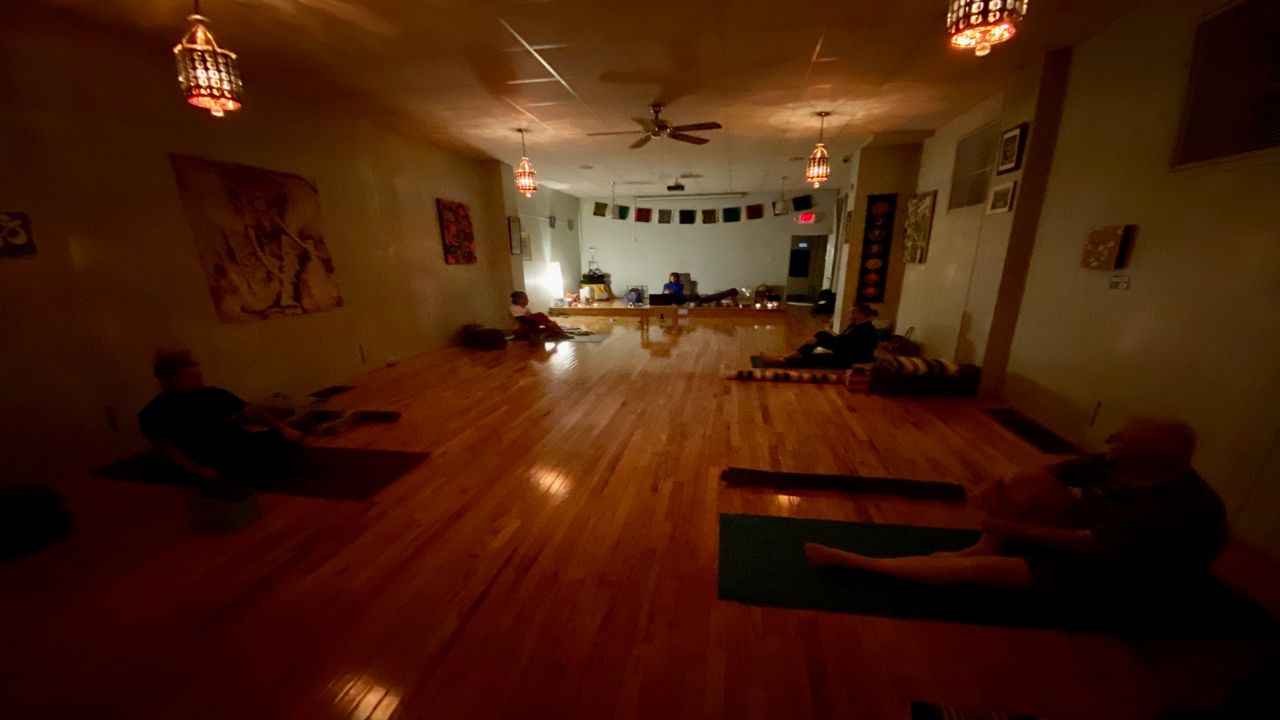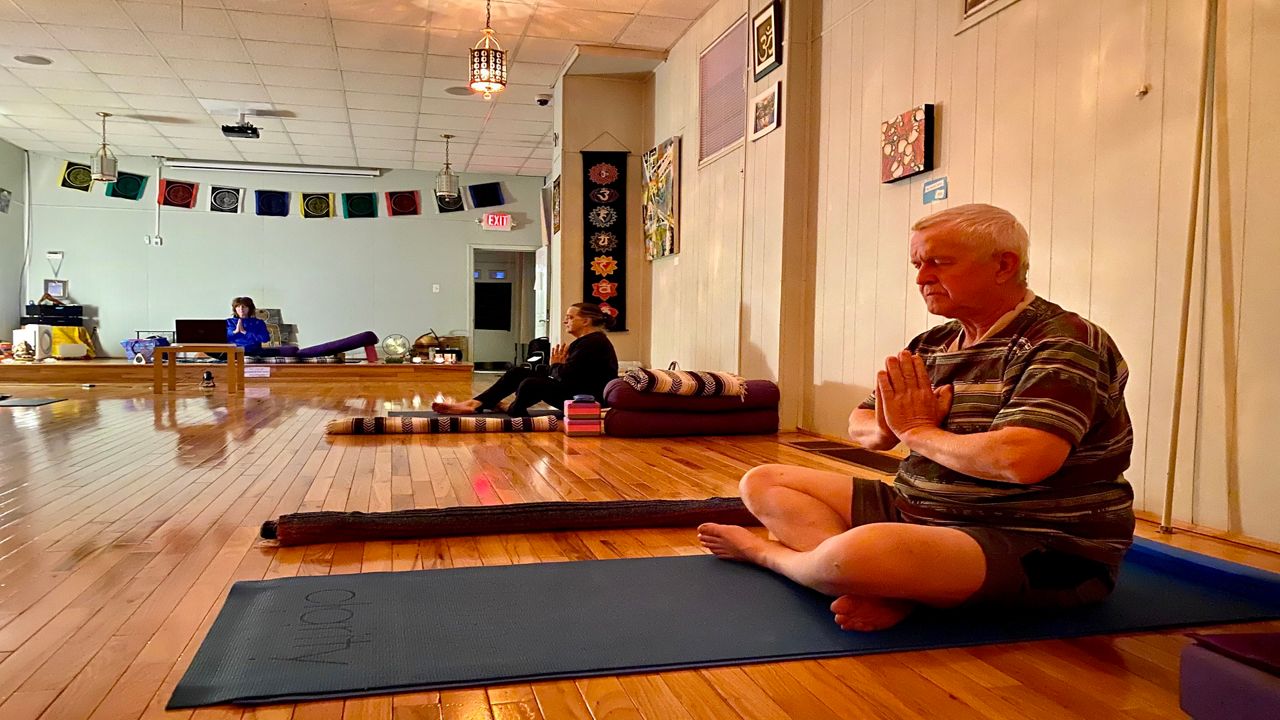NORWOOD, Ohio — A bubbly John Lavelle bursts through the True Freedom Recovery Yoga studio’s yellow door as a gold, ornate bell dangles back and forth on the doorknob, ringing to alert the instructor another yogi has arrived for class.
What You Need To Know
- Cincinnati yogi aims to aide in addiction recovery and spiritually healing
- Recovery can be a long road but one local man is attempting to give a newfound freedom through yoga to those struggling with addiction
- Executive director, Jeff Emerson, said his nonprofit studio is the only one in the world dedicated solely to addiction recovery yoga
Wearing a tie-dye face mask over his nose and mouth, Lavelle blurts out, “The Beatles say, ‘Hello, sunshine!’” followed with a hearty chuckle not far behind.
He is one of tonight's four clients ready to continue their journey of recovery from addiction through yoga.
The 67-year-old plops down on the couch just inside the yoga studio's entrance — where Lysol wipes, hand sanitizer and a thermometer are readily available at the front desk, next to a gold Buddha and colorful Ganesha statue.
Lavelle begins stripping off his shoes and socks, as well as his pants to reveal his shorts, in preparation for the 6 p.m., class that is about to start at True Freedom Recovery Yoga studio in Norwood.
He has been in recovery for the past four decades after battling an addiction to alcohol. And he attends 4-6 recovery yoga classes weekly.
“There’s a lot of good energy here,” Lavelle said, who just celebrated his 40th year of sobriety.
It’s improved not only his golf game, he jokes, but also his energy level, his everyday aches and pains have diminished, and he said, it has “quieted his mind.”
The breathing, Lavelle said, calms and slows him and his mind down, while giving him the tools to act as opposed to reacting to situations.
“We get bombarded with information and crisis after crisis after crisis and, and yoga is the whole practice of breathing, really. And the breathing just quiets you down, slows me down. I get to just take a step back, count to 10, and instead of reacting, I can tend then to act,” he said.
In fact, he said, it has improved, in some capacity, every area of his life, including his spiritual growth — a key element to his recovery that was lacking even after working his 12-step program.
"That was one of the other real benefits is the people that come here are coming here for this specific reason of increasing their spiritual and their physical and emotional wellbeing. And like anything else, if you're the least bit consistent with it, it really pays off big time in dividends. And we usually have some meditation along with the yoga. And that's been very, very, growth-wise, it's been very good for like spiritual growth,” Lavelle said.
Three years ago, someone referred him to this yoga studio and he made a resolution that New Year to commit to going to classes. It’s a commitment and step into his 40-year long recovery that he said he wished had not taken him so long to discover.
"It really would have enhanced all areas of my program: physical, emotional and spiritual. It's a shame it took 37 years to get here, but it takes what it takes,” he said.
While he said he no longer has the desire or urge to take a drink, this part of his ongoing recovery, is more about how much better his life can still become.
“How high up on the mountain do you want to go?” Lavelle posed. "And you can go as high up as you want to go. I'm one of those people that likes to continue to seek.”
And for him, it has been one of the best things he has done.
“It’s a good addition to anyone’s program,” he said. "I mean, I personally think you should have a base in whatever 12-step program you're in first, but it's definitely a good bonus. Because just like the Greeks, everything is threefold: physical, mental, spiritual, and, and this definitely helps the physical,” he said.
Emerson explains addiction from his own experience and the steps of losing his spirituality, emotional and physical balance.
“The disease is starts out, you lose your spiritual and then you'll lose your emotional. And the last thing is the physical addiction, (and) is really the hardest thing to get over,” he said. "When you get sober, the first thing you do is you feel better physically, because you're not drinking or using or whatever it is. And so right away, you think, 'Oh, I'm OK now,’ but the mental needs to be addressed. And the spiritual is the thing I lost first. I lost the spirit. And that's what turned me to alcohol because alcohol was spirit, baby. And that's the last thing to come back. But this (yoga) really enhances it, you know."
And that is one part of the overall mission for the not-for-profit, True Freedom Recovery Yoga and its executive director, Jeff Emerson.
“There are a lot of approaches to recovery. This is an enhancement to people’s recovery,” he said.
Emerson, 63, has been in recovery from addiction for several decades. But everything started around 1973 when the Beatles traveled to India.
“Well, there was something happening at the time, and, you know, a shift of consciousness. And I wanted to see what that was about. But then they also did LSD. And that didn't help me,” he said. “I did yoga all those years and meditation, but I also did a lot of drugs, and to the point where I was addicted. And then I got clean and went to college.”
Amid his own addiction, he said, yoga and meditation changed his life and turned him onto the spirituality of yoga and how it can heal and aide in his search for freedom from addiction.
Following college, Emerson started attending yoga school to become an instructor. But something stuck out for him in those classes.
"Every time through the whole program, he was talking about deep yoga philosophies, and I kept thinking, you know, what he's saying is ‘recovery.’”
So, he decided then, that he wanted to marry the two: yoga and recovery.
“The philosophy behind yoga, they talk a lot about obsessions and getting past the self. And, you know, and that is what we're trying to do in recovery, is get past this addictive self into the recovery self. But if you get past that even, then you go into the true self. And that's why this is called 'True Freedom,’” he said.
A real estate appraiser by day, Emerson has been a yoga instructor for 15 years, including as a former co-owner of Cincinnati Yoga School, where he first initiated recovery-based yoga.
Wearing a pink and green tie-dye mask, a Kelly-green True Freedom Recovery Yoga T-shirt and black sweat pants, Emerson explained how recovery yoga goes beyond the 12-step program — and how it gave him a spiritual awakening, enlightenment and deeper understanding of himself: mind, body and spirit.
"In the 12 steps, they talk about a spiritual awakening, but I wanted enlightenment. And yoga is taking me past a spiritual awakening, closer to something deeper. I'm certainly not enlightened or anything like that, don't get me wrong, but it's opening that door toward that direction,” Emerson said.
Yoga in and of itself, has proven, he said to calm the nervous system — and therefore reduce the stress and anxiety that many struggle with while addicted and then while in recovery.
And that is what he hopes to give to those who attend classes, which are open to anyone, not just those in recovery.
While recovery can be a long road Emerson’s hope is to give a newfound freedom to those struggling with addiction through yoga — but with a different take on mind, body and spirit exercise.
The notable differences between traditional yoga and recovery yoga, Emerson surmised, are that the teachers are in recovery, recovery and God are mentioned during yoga, and there is more emphasis on healing the mind, body and spirit.
"There's more emphasis on the healing aspect of yoga – whether it's mind, body or spirit, because a lot of people, also in their addiction, wrack their body up. So, there is that aspect. But the mind and body are so intricately connected in the spirit of course. Oftentimes, addictions are called a spiritual disease, or feelings disease. So, we’re touching that aspect,” Emerson said.
In fact, he said his yoga studio is the only one in the world dedicated solely to recovery yoga.
Furthermore, he said, the classes they offer build a community within themselves and brings a sense of peace and calm.
"We're all doing it together,” he said. "There's a there's a lightness in the studio, where other studios are, you know, real serious, and they want to show off how much they can do that, you know, there's a place for that and it's fine. That's not us because we want to find recovery. There should be a sense of lightness. There's enough heaviness in the world.”
Today, True Freedom Recovery Yoga totes that it is “the place for freedom to be yourself. Supporting communities recovering from addiction with yoga, healing and mindfulness."
"We are 12-step based. It is not a replacement to 12-step at all. But we can go deeper in yoga or a different direction. So it's not just the same thing that they're hearing,” he said about recovery yoga.
Also, following each yoga class, clients are offered the opportunity to attend an in-house 12-step meeting if they choose.

“Namaste,” Joy Frederick says inside the studio at True Freedom Recovery Yoga, amid calming flutes quietly playing overhead.
Tonight’s class begins inside the elongated room, planked with wood flooring and dimly lit chandeliers hanging from the ceiling. The smell of recently burned incense lingers in the air.
Amid flickering candles, healing crystals and an altar honoring each spiritual God, there is an open laptop just in front of the elevated platform where Frederick sits poised on her mat at the front of the room.
The session is open to four in-person students but is made also available via Zoom, so that clients can attend recovery yoga from the comfort and safety of their own homes since COVID-19 has mandated a reduction in class sizes from 20.
Frederick, the studio's board of directors president and trained yoga instructor, begins speaking softly to the class.
“Stay deep in that stretch, rolling the hips back and forth, just loosening up,” she instructs.

The 63-year-old has been practicing yoga for 24 years, but has been a part of the True Freedom Recovery Yoga family for eight years.
After growing up surrounded by addicted family members, as an adult, she married into addiction. Because of that, she said, she is an avid member of Al-Anon and experiences many of the same struggles that those who are addicted find themselves trapped by, like sleep deprivation and anxiety.
"What we find, is that we have our addictions, too — and it's more of an obsession on how to control the addict if they're using, but we also can become completely obsessed with work or fitness or whatever,” she said. “We almost universally find that we're either struggling with anxiety and depression or both. We're struggling with our obsessive thinking. Another universal problem is a lot of people can't sleep or they sleep too much — too much energy, not enough energy. So, it's about bringing things back into balance.”
In recovery yoga, she said, she has been able to deeply relax and meditate, allowing her to sleep better, and in turn, finding a better balance overall.
"The postures on the mat are about balance. And some of our language here is about, we find our balance and our postures, and how does that correspond with the balance in daily life?” Frederick continued.
In order to continue managing her own balance in life, she regularly attends Al-Anon meetings to deal with the issues that plague her, and moreover, with whatever life throws at her.
“It's really about living life. It's about the challenges in life. Any kind of support system helps you with everything in life,” she resolved.
For her, yoga gives her the balance in her life that she yearns for.
Her journey with recovery yoga, she said, has given her a sense of community, an unparalleled support system and connections with others participating in this unique type of yoga, as well as a peaceful reconnection within herself.
Open for a decade, True Freedom Recovery Yoga has been located in a two-story light-blue building at 1926 Mills Ave., in Norwood, next to the post office, for the past five of those years in operation.
The studio, which runs solely on donations, offers 14 classes per week, including children’s yoga for busy, recovering parents who also want to partake in the classes — all instructed by volunteers, like Emerson and Frederick. It also offers training for budding yoga instructors.
For more information about the studio and becoming an instructor, to donate, or to view a complete class schedule, visit True Freedom Recovery Yoga’s website.
